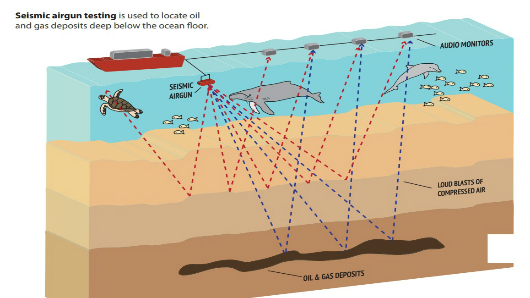Twenty NGOs have urged President Abdulla Yameen to stop plans for oil exploration in Maldivian waters, or risk the country’s economic and environmental health.
In a joint statement of concern, marine conversation NGO OceanCare’s President Sigrid Lueber warned that the oil explorations could have “severe socio-economic consequences in the fisheries and tourism sector”.
After pledging during his election campaign to begin new efforts to find oil, President Yameen’s government has claimed investor interest in the project, while a German research vessel carried out a seismic survey last August.
Speaking to Minivan News today, founder of local environmental NGO Ecocare, Maeed Zahir, said that the public does not take seriously the concerns put forward by local NGOs.
“Several people have questioned our technical expertise on oil exploration and used it as an excuse to dismiss our concerns,” said Maeed. “However, with several international NGOs speaking out against the exploration we hope it will be taken more seriously.”
The statement of concern was also sent to several members of the cabinet, including fisheries minister Dr Mohamed Shainee, tourism minister Ahmed Adeeb, economic development minister Mohamed Saeed, and environment minister Ahmed Thoriq.
President’s Office Spokesperson Ibrahim Muaz said that only the president could comment on correspondence addressed personally to him, directing Minivan News to the relevant ministers for updates on the exploration project – none of whom were responding to calls at the time of publication.
The Maldives has also been included OceanCare’s silent oceans campaign. The NGO – which was granted Special Consultative Status with the UN’s Economic and Social Council in 2011 – is encouraging people to write to Adeeb urging an end to exploration.
Seismic impact
The NGO coalition’s statement of concern warned that exploration will have adverse effects on the Maldivian economy as a result of negative impacts on fisheries.
Seismic air guns – one of the most commonly used survey methods for offshore oil exploration – produce loud bursts of sound by introducing air into water at high pressure which then penetrates hundreds of kilometers into the earth’s crust.
OceanCare stated that the air guns produce a pulse of noise lasting 20 to 30 milliseconds, which is repeated an average of every 10 to 15 seconds, often for 24 hours a day.
“Three decades of controlled scientific studies leave no doubt that intense sound damages fish and impact fisheries,” said the Swiss NGO. “Ocean noise has a negative effect on at least 55 marine species.”
A recent study commissioned by the Namibian government revealed a sharp decline in catch as a result of increased seismic exploration in the Orange River Basin. The country’s tuna catch shrunk from 4,046 tons in 2011 to a mere 650 tons in 2013 after a shift in migratory routes.

Similarly, the Australian tuna industry has said the process may threaten the survival, abundance, or evolutionary development of native species or ecological communities.
Additionally, a recent study into the impacts of air guns on marine life ranked them as the second highest contributor of underwater noise caused by humans – only underwater nuclear detonations have been found to cause more.
The NGO statement also noted the adverse effects on marine biodiversity as a result of such surveys, pointing out that Maldivian tourism is heavily dependent on a healthy and diverse marine eco-system.
Tourism and fishing account for 90 percent of the Maldives’ GDP, while providing three-quarters of all employment and two thirds of foreign exchange earnings.
The government’s development plans include both a reduced reliance on tourism, as well as minimising the country’s dependence on imported fuel through the enhanced use of renewables. Imported fuel consumes around one third of the Maldives’ GDP.
Preliminary Research
Last year, the German research vessel ‘Sonne‘ – which came to the Maldives to conduct research into global warming – conducted preliminary research exploration free-of-charge on the government’s request.
While pointing out the importance of proper Environmental Impact Assessments in oil explorations, the coalition of environmental groups expressed concern that no such EIA or public consultation was undertaken prior to this research.
Speaking at the time, fisheries minister Dr Shainee said that explorations will be carried out in one of three areas which have properties suggesting the presence of oil and gas. The identified locations were located 100 miles east of the area between Laamu and Thaa atoll.
Shainee also said that the information obtained will be shared with the Maldives in the first quarter of 2015. He said that the data would not be shared with any third party, and that further explorations would follow to confirm any positive findings.
In February 2014, the Maldives National Oil Company Ltd – a subsidiary of the State Trading Organization – said it would soon begin advertising the country as a destination for oil exploration.
Speaking at the 18th Saarc Summit held last year, Indian Prime Minister Narendra Modi said that India wishes to assist Maldives in its search for oil reserves, while cabinet members reported that oil exploration was on the agenda of the first China-Maldives joint commission on trade, held in December.
Related to this story
Maldives to begin oil exploration with assistance of research vessel
Oil drilling and Maldives’ tourism “cannot coexist”, says NGO Bluepeace
Maldives National Oil Company seeks assistance with oil exploration